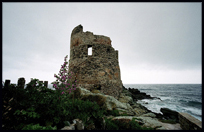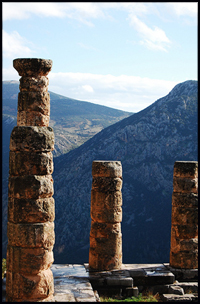 By PAT HARTMAN
By PAT HARTMAN
News Editor
In the Davidsonian, Katie Lovett gives an account of a recent lecture delivered by travel writer Doug Lansky. (This Lansky character, by the way, turned down the offer of a steady gig from The New Yorker, so you gotta know he has a sense of humor.) Lovett says of Lansky:
His big break as a travel writer came with the syndication of his humor-adventure column “Vagabond”… “Vagabond” chronicled the seemingly fearless Lansky’s global exploits which included braving hotels in third world countries, mastering white water kayaking in Chile and pony trekking in South Africa.
He also goes to tamer places, like the world’s biggest indoor beach, which happens to be located in Japan, within walking distance of a real beach. He also rode an Australian ostrich and tried a little sumo wrestling, if such an expression can be used of a sport so imbued with largeness.
As we’ve seen over and over again in literature, travel and humor seem to go together like popcorn and butter. Mark Twain was hip to their compatibility, as are several contemporary writers including F. Daniel Harbecke, who offers a fascinating look at the similarities between travel and improvisational theater at Brave New Traveler.
Many seasoned travelers warn against canned humor. Most jokes just don’t translate. What does translate is a nifty attitude of openness, and willingness to be the butt of other people’s jokes. So, did you see “Zang-e-Khatar” the other night? This is almost impossible to believe, but Afghanistan is now the source of TV shows that satirize the country’s own government and government wanna-bes. Of course, some of the TV stations are owned by medieval warlords – but if you’re the Kabul version of Larry the Cable Guy, you’ve got to work with what’s available, and Afghan humorists seem to be doing just that. This report from Christian Science Monitor correspondent Issam Ahmed is a real ray of sunshine. And while we’re recommending links, here’s a funny story.
But the best stories (no, we’re not the least bit biased) come from Kevin Dolgin in The Third Tower Up From the Road. Well, the darn book had better be good for something, being as how the author promises that it contains “pretty much no practical advice.” In fact, Kevin can be downright unhelpful, as the following paragraph will illustrate:
Midnight swims are nice anywhere, but nowhere more so than in Corsica. There are no big beaches on the island, only a succession of little coves, more or less difficult to access, most of which you really have to know about in order to reach. I know of several, and, of course, there’s no way I’m going to tell you how to get to them.
Thanks a lot, Dude! But we forgive him, because he does provide plenty of tips you’ll get nowhere else, like a bar bet you might be unfamiliar with — you’ve got to finance that trip somehow, right? And the directions to an interesting locale that “could serve as a kind of polar opposite to a Zen rock garden-a place to come and screw up your head.” Irresistible, no? Within these pages are sightings of unorthodox taxidermy, the secret recipe for giant bubble liquid, and much, much more.
But it’s not all fun and games, oh no. Do you appreciate integrity? Kevin’s got it. For instance, only if he has personally test-ridden a merry-go-round will he report back to us that it’s a great merry-go-round. You can’t ask for fairer than that! On the other hand, he does tend to be the teensiest bit of a complainer once in a while:
French mountain dwellers have an inconvenient habit of roofing their buildings with corrugated metal, for the unconvincing reason that the snow slides off it nicely. How dare they ruin my aesthetic experience for the sake of mundane practicality!
But then, we’re talking about a guy who gets his kicks from accosting total strangers in foreign climes and saying silly things about hedgehogs. So, consider the source.
photo courtesy of Swami Stream , used under this Creative Commons license

 By PAT HARTMAN
By PAT HARTMAN There are aspects upon which we have not yet touched. For instance, did you know that Corsica is the home of many nudist colonies, such as Chiappa? Everybody knows Napoleon was born in Ajaccio, but few realize that the mythical character Ulysses lost many of his ships to malicious destruction, and his crew to cannibals, at Bonifacio. Did you know that in 1941, Douglas Fairbanks, Jr., made a movie called The Corsican Brothers? Or that there’s a 6,000-year-old castle at Arraghju?
There are aspects upon which we have not yet touched. For instance, did you know that Corsica is the home of many nudist colonies, such as Chiappa? Everybody knows Napoleon was born in Ajaccio, but few realize that the mythical character Ulysses lost many of his ships to malicious destruction, and his crew to cannibals, at Bonifacio. Did you know that in 1941, Douglas Fairbanks, Jr., made a movie called The Corsican Brothers? Or that there’s a 6,000-year-old castle at Arraghju? By PAT HARTMAN
By PAT HARTMAN


